- Home
- Charles de Lint
Spirits in the Wires
Spirits in the Wires Read online
Spirits in the Wires
By Charles de Lint from Tom Doherty Associates
ANGEL OF DARKNESS
DREAMS UNDERFOOT
THE FAIR AT EMAIN MACHA
FORESTS OF THE HEART
FROM A WHISPER TO A SCREAM
GREENMANTLE
I’LL BE WATCHING YOU
INTO THE GREEN
THE IVORY AND THE HORN
JACK OF KINROWAN
THE LITTLE COUNTRY
MEMORY AND DREAM
MOONHEART
MOONLIGHT AND VINES
MULENGRO
THE ONION GIRL
SOMEPLACE TO BE FLYING
SPIRITS IN THE WIRES
SPIRITWALK
SVAHA
TAPPING THE DREAM TREE
TRADER
THE WILD WOOD
YARROW
Spirits in the Wires
Charles de Lint
A Tom Doherty Associates Book
New York
The author and publisher have provided this e-book to you without Digital Rights Management software (DRM) applied so that you can enjoy reading it on your personal devices. This e-book is for your personal use only. You may not print or post this e-book, or make this e-book publicly available in any way. You may not copy, reproduce or upload this e-book, other than to read it on one of your personal devices.
Copyright infringement is against the law. If you believe the copy of this e-book you are reading infringes on the author’s copyright, please notify the publisher at: us.macmillanusa.com/piracy.
This is a work of fiction. All the characters and events portrayed in this novel are either fictitious or are used fictitiously.
SPIRITS IN THE WIRES
Copyright © 2003 by Charles de Lint
“Extract from the journals of Christy Riddell” first appeared as part of the limited edition chapbook, The Fields Beyond the Fields; Triskell Press, 1997.
Copyright © 1997 by Charles de Lint.
The lines from “Arabesque” are from the short story “Saskia,” which first appeared in Space Opera, edited by Anne McCaffrey and Elizabeth Ann Scarborough; DAW Books, 1996. Copyright © 1996 by Charles de Lint.
All rights reserved, including the right to reproduce this book, or portions thereof, in any form.
A Tor Book
Published by Tom Doherty Associates, LLC
175 Fifth Avenue
New York, NY 10010
www.tor.com
Tor® is a registered trademark of Tom Doherty Associates, LLC.
Library of Congress Cataloging-in-Publication Data
De Lint, Charles, 1951–
Spirits in the wires / Charles de Lint.
p. cm.
“A Tom Doherty Associates book.”
ISBN 0-312-86971-1 (PBK)
EAN 978-0312-86971-7 (PBK)
1. Fantasy fiction, Canadian. 2. Technology—Fiction. I. Title.
PR9199.3D357S65 2003
813'.54—dc21
2003041410
Printed in the United States of America
0 9 8 7 6 5 4
This one’s for my long-time pal
Rodger Turner
Break the bowl—
instead of regret,
fall back into
the potter’s hands
and be reborn.
—SASKIA MADDING
“Falling” (Spirits and Ghosts, 2000)
Contents
Author’s Note
First Meeting
How We Were Born
And Here We Are
The World Wide Web Blues
Shadows in the Wordwood
This, Too, Shall Pass
Author’s Note
The impetus to write this book, and the title as well, was sparked by some offhand remarks made by my friend Richard Kunz concerning how, with the ever-growing prevalence of technology in the world, some of the spirits of fairy tale and folklore have probably already left the woodlands and other pastoral settings to take up residence in the wires that seem to connect us to everything: telephone, cable, electricity. No doubt they’re in the satellite feeds as well.
I’d touched on this in some previous short stories (such as “Saskia,” which you can find in my collection Moonlight and Vines, and “Pixel Pixies,” in the more recent Tapping the Dream Tree collection), but the more I thought about it, the more I wanted to explore it at a longer length. So finally I put aside the plans I had for the next novel I was going to write and jumped happily into this one instead, even though it will be the second novel in a row to feature my regular repertory company of Newford characters taking their turn on the main stage, rather than going about their lives in the background of the books as they usually do.
Considering the origins of Spirits in the Wires, I should first thank Richard for those conversations, not forgetting his wife, Mardelle, who is not only a friend, but who has also done such a fine job of copyediting on a number of my books—those would be the ones without typos and the like.
I’d also like to thank:
Rodger Turner for great heaps of technical advice (with the usual caveat that any screw-ups are my fault, not his);
my coterie of friends, family and well-wishers (too numerous to name—you know who you are), without whom writing these books would be a far lonelier proposition;
my editors Gordon Van Gelder, Jo Fletcher, Patrick Nielsen Hayden, Sharyn November, and Terri Windling, all of whom are friends more than business associates;
Cat Eldridge, David Tamulevich, and the handful of readers who continue to send such wonderful music my way, as well as all the amazing musicians who, through the years, have kept my brain fertile and my spirits lifted with their music;
and last, but never least, Mary Ann for her love, comfort, and support; for the music in her heart and the poetry in her soul; for her astute reader’s eye and red pen, and her sharp negotiating skills. And you know what? She’s wilder than me.
If any of you are on the Internet, come visit my home page at www. charlesdelint.com
—Charles de Lint
Ottawa, Autumn 2002
Extract from the journals of Christy Riddell
According to Jung, at around the age of six or seven we separate and then hide away the parts of ourselves that don’t seem acceptable, that don’t fit in the world around us. Those unacceptable parts that we secret away become our shadows.
I remember reading somewhere that it can be a useful exercise to visualize the person our shadow would be if it could step out into the light. So I tried it. It didn’t work immediately. For a long time, I was simply talking to myself. Then, when I did get a response, it was only a spirit voice I heard in my head. It could just as easily have been my own. But over time, my shadow took on more physical attributes, in the way that a story grows clearer and more pertinent as you add and take away words, molding its final shape.
Not surprisingly, my shadow proved to be the opposite of who I am in so many ways. Bolder, wiser, with a better memory and a penchant for dressing up with costumes, masks, or simply formal wear. A cocktail dress in a raspberry patch. A green man mask in a winter field. She’s short, where I’m tall. Dark-skinned, where I’m light. Red-haired, where mine’s dark. A girl to my boy, and now a woman as I’m a man.
If she has a name, she’s never told me it. If she has an existence outside the times we’re together, she has yet to divulge it either. Naturally, I’m curious about where she goes, but she doesn’t like being asked questions and I’ve learned not to press her, because when I do, she simply goes away.
Sometimes I worry about her existence. I get anxieties about schizophrenia and carefully study myself for other symptoms. But if she’s a de
lusion, it’s singular, and otherwise I seem to be as normal as anyone else, which is to say, confused by the barrage of input and stimuli with which the modern world besets us, and trying to make do. Who was it that said she’s always trying to understand the big picture, but the trouble is, the picture just keeps getting bigger? Ani DiFranco. I think.
Mostly I don’t get too analytical about it—something I picked up from her, I suppose, since left to my own devices, I can worry the smallest detail to death.
We have long conversations, usually late at night, when the badgering clouds swallow the stars and the darkness is most profound. Most of the time I can’t see her, but I can hear her voice. I like to think we’re friends; even if we don’t agree about details, we can usually find common ground on how we’d like things to be.
First Meeting
Don’t make of us
more than what we are,
she said.
We hold no great secret…
—SASKIA MADDING,
“Arabesque” (Moths and Wasps, 1997)
Christiana Tree
“I feel as if I should know you,” Saskia Madding says as she approaches my chair.
She’s been darting glances in my direction from across the cafe for about fifteen minutes now and I was wondering when she’d finally come over.
I saw her when I first came in, sitting to the right of the door at a window table, nursing a tall cup of chai tea. She’d been writing in a small, leather-bound book, fountain pen in one hand, the other holding back the spill of blonde hair that would otherwise fall into her eyes. She looked up when I came in and showed no sign of recognition, but since then she’s been studying me whenever she thinks I’m not paying attention to her.
“You do know me,” I tell her. “I’m pieces of your boyfriend—the ones he didn’t want when he was a kid.”
She gives me a puzzled look, though I can see a kind of understanding start up in the back of those pretty, sea-blue eyes of hers.
“You—are you the woman in his journals?” she asks. “The one he calls Mystery?”
I smile. “That’s me. The shadow of himself.”
“I didn’t…”
“Know I was real?” I finish for her when her voice trails off.
She shakes her head. “No. I just didn’t expect to ever see you in a place like this.”
“I like coffee.”
“I meant someplace so mundane.”
“Ah. So you’ve made note of all those romantic flights of fancy he puts in those journals of his.” I close my eyes, shuffling through pages of memory until I find one of them. “ ‘I can see her standing among the brambles and thorns of some half-forgotten hedgerow in a green bridal dress, her red hair set aflame by the setting sun, her eyes dark with mysteries and stories, a wooden hare’s mask dangling from one languid hand. This is how I always see her. In the hidden and secret places, her business there incomprehensible yet obviously perfectly suited to her curious, evasive nature.’ “
I get a smile from Saskia, but I don’t know if it’s from the passage I’ve quoted, or because I’m mimicking Christy’s voice as I repeat the words.
“That’s a new one,” she says. “He hasn’t read it to me yet.”
“You wait for him to read them to you?”
“Of course. I would never go prying …” She pauses and gives me a considering look. “When do you read them?”
I shrug. “Oh, you know. Whenever. I don’t really sleep, so sometimes when I get bored late at night I come by and sit in his study for awhile to read what he’s been thinking about lately.”
“You’re as bad as the crow girls.”
“I’ll take that as a compliment.”
“Mmm.” She studies me for a moment before adding, “You don’t read my journals do you?”
I muster a properly offended look, though it’s not that I wouldn’t. I just haven’t. Yet.
“I’m sorry,” she says. “Of course you wouldn’t. We don’t have the same connection as you and Christy do.”
“Does that connection bother you?”
She shakes her head. “That would be like being bothered by his having Geordie for a brother. You’re more like family—albeit the twin sister who only comes creeping by to visit in the middle of the night when we’re both asleep.”
I shrug, but I don’t apologize.
“I’m only his shadow,” I say.
She studies me again, those sea-blue eyes of hers looking deep into mine.
“I don’t think so,” she says. “You’re real now.”
That makes me smile.
“As real as I am, anyway,” she adds.
My smile fades as I see the troubled look that comes over her. I forget that her own exotic origins are no more than a dream to her most of the time—a dream that makes her uncomfortable, uneasy in her skin. I wish I hadn’t reminded her of it, but she puts it away and brings the conversation back to me.
“Why won’t you tell Christy your name?” she asks.
“Because that would let him put me in a box labeled This is Christiana’ and I don’t want to be locked into who he thinks I am. The way he writes about me is bad enough. If he had a name to go with it he might be able to fix it so that I could never change and grow.”
“He does like his routines,” she says.
I nod. “His picture’s in the dictionary, right beside the word.”
We share a moment’s silence, then she cocks her a head, just a little.
“So your name’s Christiana?” she asks.
“I call myself Christiana Tree.”
That brings back a genuine smile.
“So that would make you Miss Tree,” she says.
I’m impressed at how quickly she got it as I offer her my hand.
“In the flesh,” I tell her. “Pleased to meet you.”
“But that’s only what you call yourself,” she says as she shakes my hand.
“We all have our secrets.”
“Or we wouldn’t be mysteries.”
“That, too.”
She’s been sitting on her haunches beside the easy chair I commandeered as soon as I’d picked up my coffee and sticky-bun from the counter, leaning her arms on one of the chair’s fat arms. There’s another chair nearby, occupied by a boy in his late teens with blue hair and razor-thin features. He’s been listening to his Walkman loud enough for me to identify the music as rap, though I can’t make out any words, and flipping through one of the cafe’s freebie newspapers while he drinks his coffee. He gets up now and I give a vague wave to the vacant chair with my hand.
“Why don’t you get more comfortable,” I say to Saskia.
She nods. “Just let me get my stuff.”
Some office drone in a tailored business suit, tie loose, top shirt button undone, approaches the chair while Saskia collects her things. I put my scuffed brown leather work boots up on its cushions and give him a sugar and icicle smile—you know, it looks sweet, but there’s a chill in it. He’s like a cat as he casually steers himself off through the tables and takes a hardback chair at one of the small counters that enclose the cafe’s various rustic wooden support beams, making it look like that’s what he was aiming for all along.
Saskia returns. She drops her jacket on the back of the chair, puts her knapsack on the floor, and settles down, tea in hand.
“So, what were you writing?” I ask.
She shrugs. “This and that. I just like playing with words. Sometimes they become something—a journal entry, a poem. Sometimes I’m just following words to see where they go.”
“And where do they go?”
“Anyplace and everyplace.”
She pauses for a moment and has a sip of her tea, sets the cup down on the low table between us. Later I realize she was just deciding whether to go on and tell me what she now does.
“You know, we’re like words,” she says. “You and me. We’re like ghost words.”
I have to smile. I’m beginning
to understand why Christy cares about her the way he does. She’s a sweet, pretty blonde, but she doesn’t fit into any sort of a tidy descriptive package. Her thinking’s all over the place, from serious to whimsical, or even some combination of the two. I think I just might have a poke through her journals the next time I’m in their apartment and they’re both asleep. I’d like to know more about her—not just what she has to say, but what she thinks when there’s nobody supposed to be listening.
“Okay,” I say. “I’ll bite. What are ghost words?”
“They’re words that don’t really exist. They come about through the mistakes of editors and printers and bad proofreaders, and while they seem like they should mean something, they don’t. Like ‘cablin’ for ‘cabin,’ say.”
I see what she means.
“I like that word,” I tell her. “Cablin. Maybe I should appropriate it and give it a meaning.”
Saskia gives a slow nod. “You see? That’s how we’re like ghost words. People can appropriate us and give us meanings, too.”
I know she’s talking about our anomalous origins—how because of them, we could be victim to that sort of thing—but I don’t agree.
“That happens to everybody,” I tell her. “It happens whenever someone decides what someone is like instead of finding out for real.”
“I suppose.”
“You’re thinking about all of this too much.”
“I can’t seem to stop thinking about it.”
I study her for a long moment. It’s worrying her, this whole idea of what’s real and what isn’t, like how you came into this world is more important than what you do once you’re here.
“What’s the first thing you remember?” I ask.
How We Were Born
Words are like a corridor;

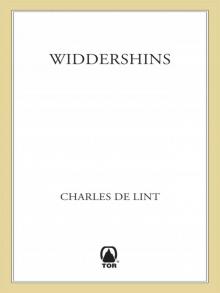 Widdershins
Widdershins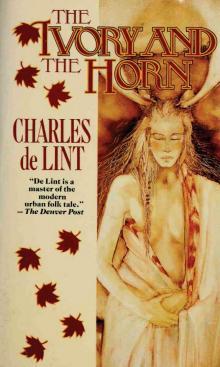 The Ivory and the Horn
The Ivory and the Horn Yarrow
Yarrow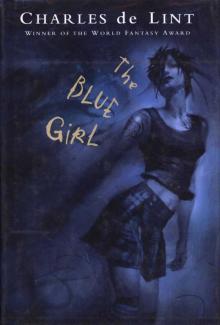 The Blue Girl
The Blue Girl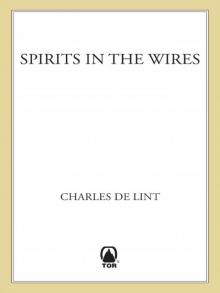 Spirits in the Wires
Spirits in the Wires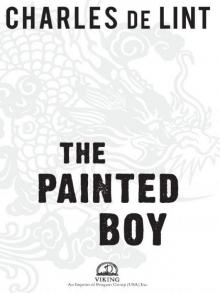 The Painted Boy
The Painted Boy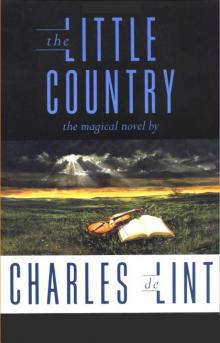 The Little Country
The Little Country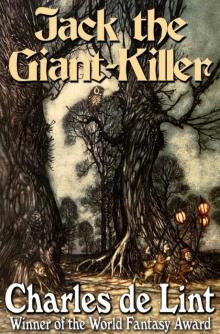 Jack of Kinrowan: Jack the Giant-Killer / Drink Down the Moon
Jack of Kinrowan: Jack the Giant-Killer / Drink Down the Moon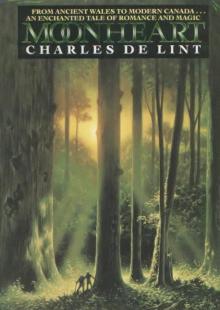 Moonheart
Moonheart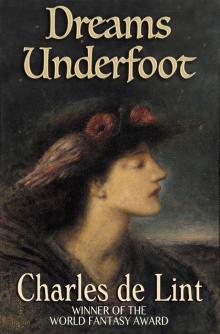 Dreams Underfoot
Dreams Underfoot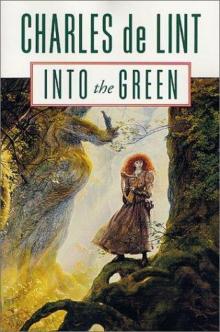 Into the Green
Into the Green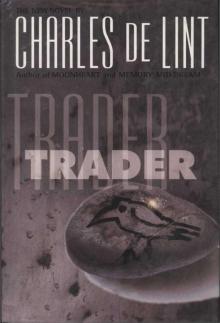 Trader
Trader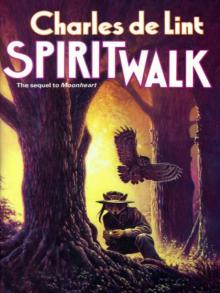 Spiritwalk
Spiritwalk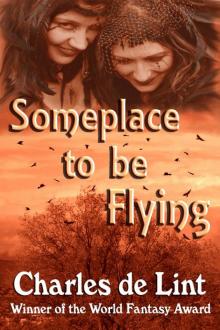 Someplace to Be Flying
Someplace to Be Flying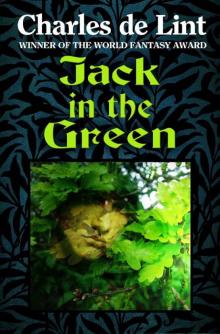 Jack in the Green
Jack in the Green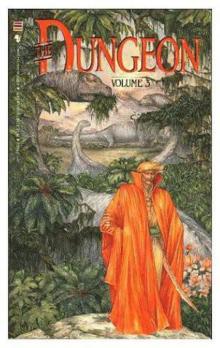 The Valley of Thunder
The Valley of Thunder Out of This World
Out of This World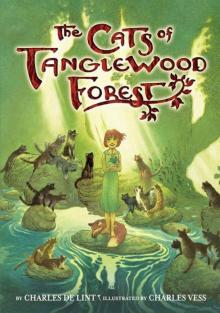 The Cats of Tanglewood Forest
The Cats of Tanglewood Forest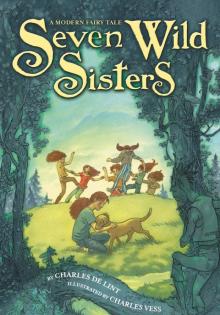 Seven Wild Sisters
Seven Wild Sisters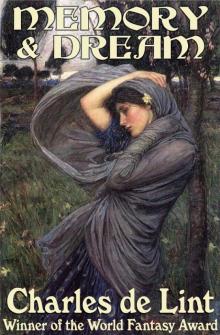 Memory and Dream
Memory and Dream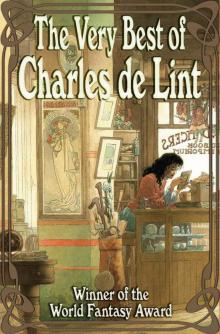 The Very Best of Charles De Lint
The Very Best of Charles De Lint Under My Skin
Under My Skin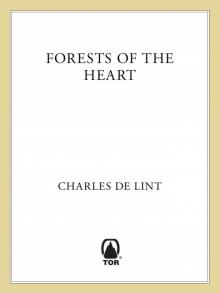 Forests of the Heart
Forests of the Heart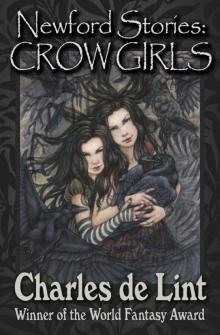 The Newford Stories
The Newford Stories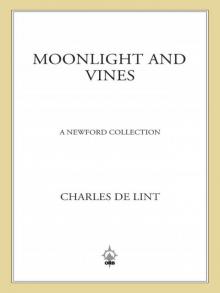 Moonlight and Vines
Moonlight and Vines Angel of Darkness
Angel of Darkness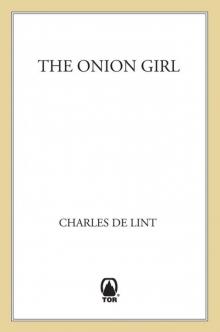 The Onion Girl
The Onion Girl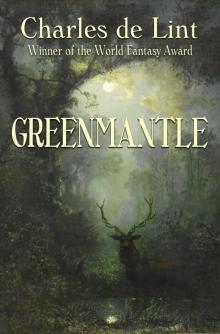 Greenmantle
Greenmantle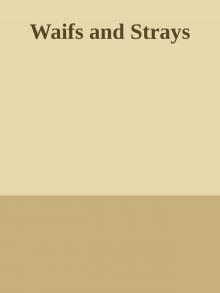 Waifs And Strays
Waifs And Strays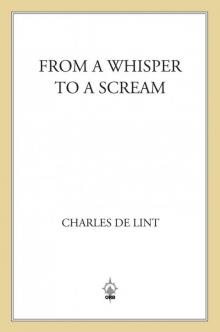 From a Whisper to a Scream
From a Whisper to a Scream Over My Head
Over My Head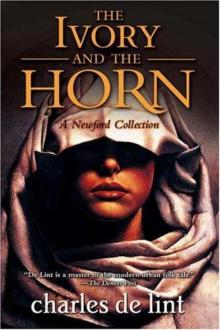 The Ivory and the Horn n-6
The Ivory and the Horn n-6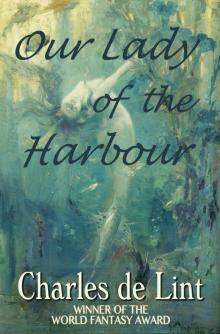 Our Lady of the Harbour
Our Lady of the Harbour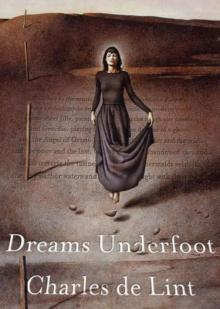 Dreams Underfoot n-1
Dreams Underfoot n-1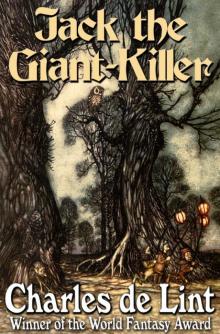 Jack the Giant-Killer (Jack of Kinrowan Book 1)
Jack the Giant-Killer (Jack of Kinrowan Book 1)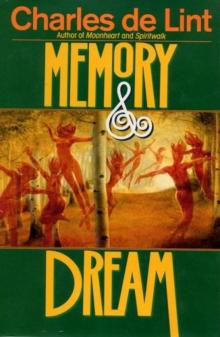 Memory and Dream n-5
Memory and Dream n-5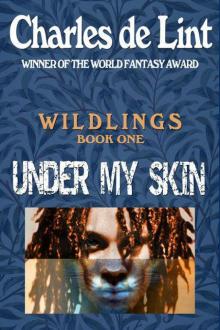 Under My Skin (Wildlings)
Under My Skin (Wildlings)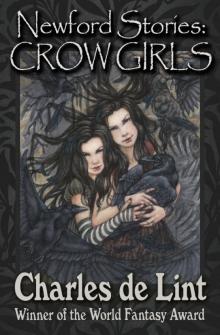 Newford Stories
Newford Stories The Wind in His Heart
The Wind in His Heart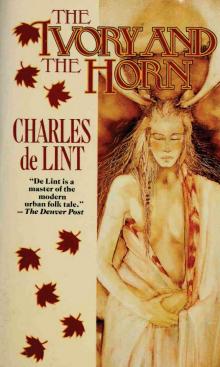 Ivory and the Horn
Ivory and the Horn